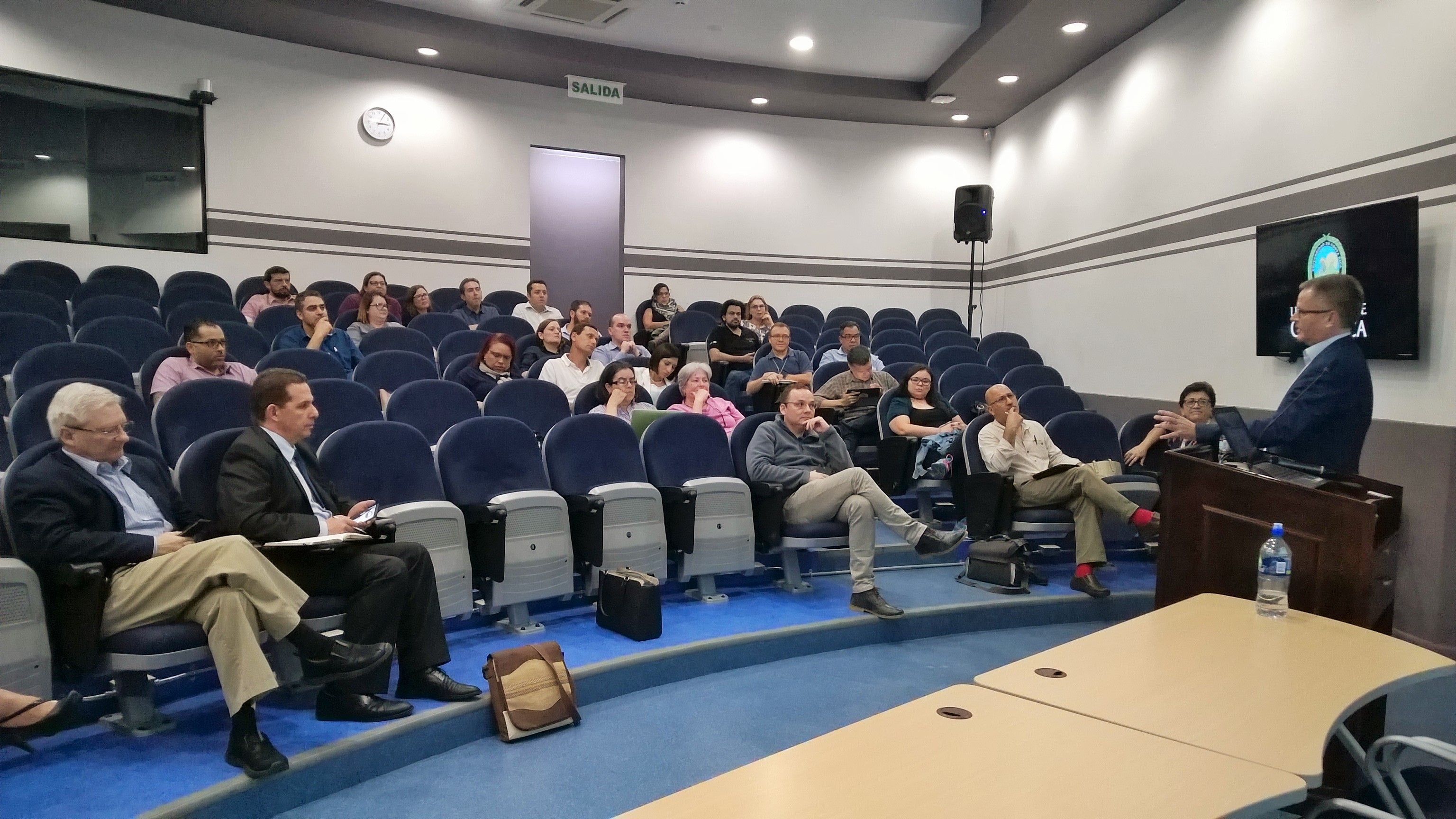DFG Re-Establishes Contact with Costa Rica
(02.01.18) At the beginning of December, a DFG delegation travelled to Costa Rica to investigate the country's research potential and to find out about options for joint funding of German-Costa Rican projects. During their four-day stay in San José, Alajuela and Cartago, Dietrich Halm, head of the Division for International Affairs – Latin America and the Caribbean from DFG Head Office in Bonn, and Kathrin Winkler, head of the DFG Latin America Office in São Paulo, visited local funding organisations and higher education institutions.

The DFG delegation informed the Costa Rican institutions about funding instruments and options for international cooperation
© DFG
The small Central American country is well known for its biological diversity and natural beauty, but has also drawn increased attention because of its continuous economic growth, political stability and considerable investment in education and research during the past ten years. In 2017, 8% of gross domestic product was invested in that sector.
Costa Rica currently has the second lowest rate of illiteracy in the region after Cuba, and has a solid system of higher education. In Latin America, only Uruguay and Chile have more students per 100,000 inhabitants. This scenario plays an important role in the development of the research sector in Costa Rica, creating a good basis for re-establishing relations between the DFG and local institutions.
The nomination of DAAD alumna Prof. Dr. Giselle Tamayo Castillo as President of the National Council for Scientific Research and Technology (Consejo Nacional para Investigaciones Científicas y Tecnológicas – CONICIT) in 2016 provided new impetus, and since then the institution has intensified its efforts to strengthen international cooperation - in particular with Germany. Since 1991, there has been a formal cooperation agreement between the DFG and CONICIT. “It is our goal to apply this agreement as an active instrument for the joint funding of bilateral research projects,” underlined Dietrich Halm.
CONICIT is in charge of funding research projects and early career researchers and is independently run. The institution’s budget comes in the main from the Ministry for Science and Telecommunications (MICITT); a smaller part is provided directly by the Costa Rican government in the form of funds from the Inter-American Development Bank, which flow into research areas that are in the national interest. On 6 December, the DFG delegation met with CONICIT president Castillo, secretary general Arturo Vicente León and coordinator Max Cerdas López in San José to discuss possibilities for joint project funding. Topics of discussion included the co-financing of workshops for the development of international cooperation – an instrument intended to strengthen existing contacts between researchers in Germany and Costa Rica.
Another important institution in the research sector is the Costa Rican Rectors Council (CONARE). With representatives of CONARE, too, the DFG delegation held an informative discussion about perspectives for international cooperation. CONARE is an independent organisation of the five public universities in the country and is responsible for the distribution and assignment of state funding to its member institutions. The meeting in San José was attended by the rectors of the Universidad de Costa Rica (UCR), the Tecnológico de Costa Rica (TEC), the Universidad Nacional (UNA), the Universidad Técnica Nacional (UTN) and the Universidad Estatal a Distancia (UNED). Both sides expressed great interest in the joint funding of projects to develop international cooperation (for example, bilateral workshops) in the form of a continuous process allowing the submission of proposals at any time and without fixed deadlines. The dialogue was continued after the trip, with the goal of enabling joint funding for research projects by the end of this year.
Although Costa Rica has 64 institutions of higher education in total, nearly all scientific research is performed by the five state universities, which provide more than half of the country’s research institutes. The majority of students also come from CONARE member organisations. These institutions of higher education benefit from financial stability and independence in planning and management, as it is legally stipulated that their annual budget may not drop below the previous year’s rate. However, to achieve a marked increase in funding, they must usually negotiate with the government, via CONARE. Currently, 18% of research and development is performed on behalf of the government, and 55% is for purely academic purposes. The rest takes place in connection with business, with non-governmental organisations or with other private establishments.
As part of the trip, Halm and Winkler also visited two CONARE member universities. In the Costa Rican capital, the programme included a meeting at UCR, the country’s largest higher education institution. As such, the institution has a high budget and funding for research projects and grants. UCR has an international focus and has cooperation agreements with over 40 countries, including with 16 research institutions in Germany – in the main regarding mobility funding. In addition, a postdoctoral programme for international researchers was created, which is intended to enable a stay of up to two years at UCR and contribute to the integration of new knowledge from outside into the research at the university. In talks with the DFG representatives, Rector Prof. Dr. Henning Jensen and the Vice-Rector for Research, Prof. Dr. Fernando García, affirmed UCR’s wish to intensify research cooperation with Germany.
The second visit to a higher education institution took the DFG delegation to Cartago, home of the TEC, a study and research institution specialising in natural and engineering sciences. The Vice President for Research, Prof. Dr. Paola Vega Castillo, and the Head of the Office of the Vice-Rector for Research, Prof. Dr. Dagoberto Arias Aguilar, were delighted to hear of the rapprochement between the DFG and the Costa Rican organisations CONARE and CONICIT. The possibility of bilateral funding opens up new perspectives for TEC researchers in the form of international projects.